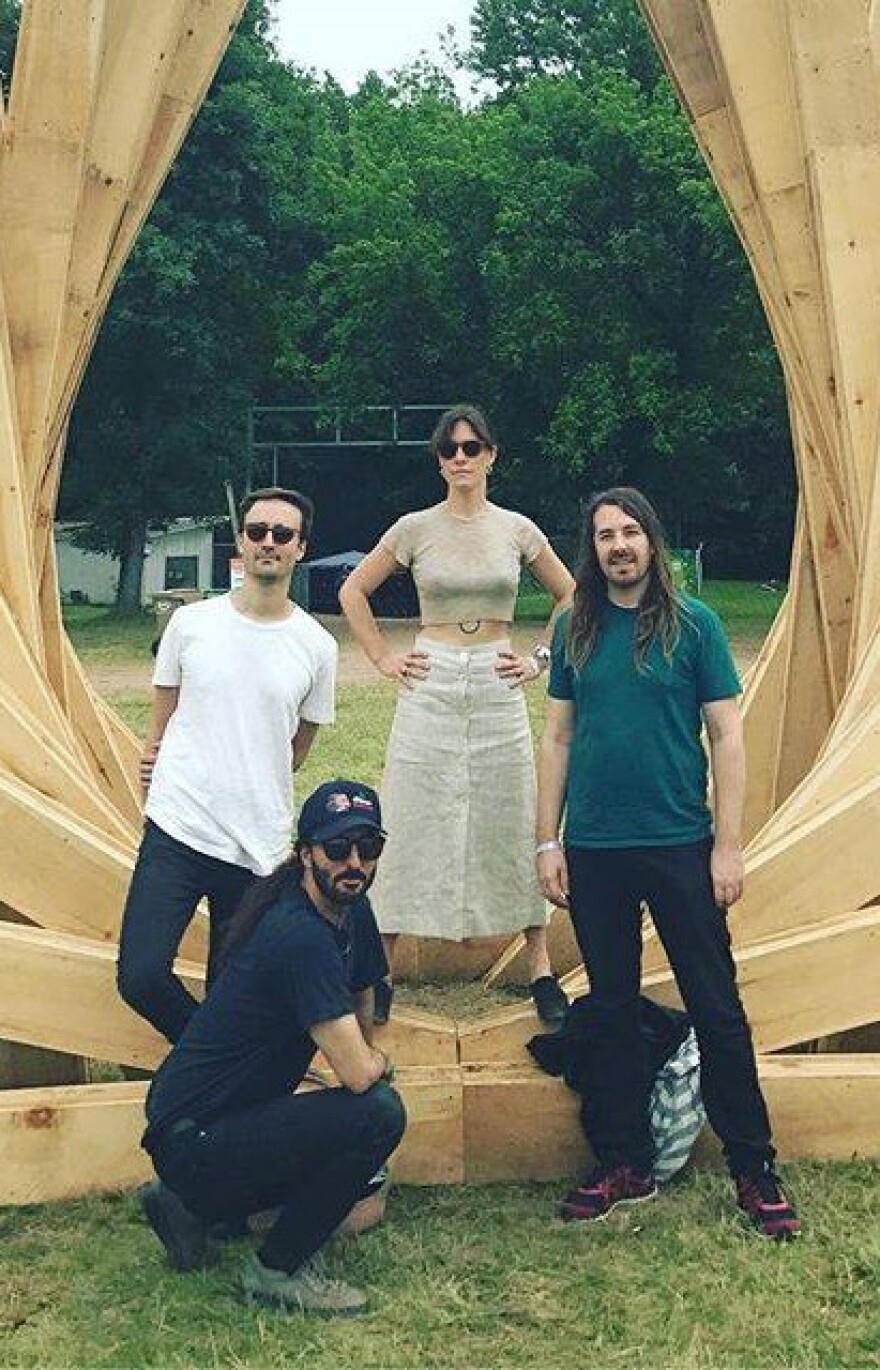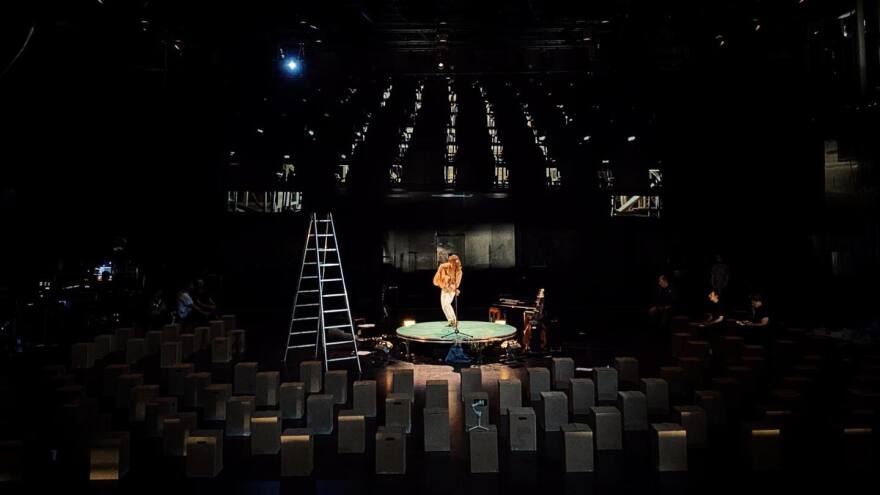Throughout her twenty-something years as an artist, Canadian indie pop singer-songwriter Feist hasn’t shied away from dynamic shifts. Her latest album, Multitudes, is a multi-layered creature, formed and stretched from its unadorned foundation to its tippy-toes, where it shoots into the stratosphere with screams and stomps. Yet it truly reflects the time during which it was born.
Many of the tracks were brought to life during a pandemic-driven “song a day” challenge (inspired by a crew of like-minded musical peers). The writings that resulted rewind, review and expand on Feist’s experiences in recent years — the more hushed, searching moments of lockdown life, grappling with a semblance of normalcy; weathering the twists and turns of moving from Toronto to California; taking in motherhood; and losing her father unexpectedly. These new songs hold weight for Feist but also carry a collective weight the world can easily register.
Reinventing how to present her songs in a live setting to a smaller-by-necessity audience brought Feist connection and sustenance. Her vulnerability as a musician — and a human — got taken to a new level as her audience became literally immersed in her music, surrounding her on all sides (no stage, no stage lighting, complete with Dolby Atmos surround sound) to connect in a very human way.
The most unusual thing about this process? Feist recorded the album after completing her immersive and spatially oriented touring experience, connecting everything together — song-a-day-creations included — on one of her most tangibly human records to date.
I talked with Leslie Feist just before Multitudes’ official release about Wisconsin memories (since she’s launching her upcoming tour from Madison), her very well-received new album and creating a wildly different concert experience
The following interview has been edited for length and clarity.
You kick off your tour in Wisconsin of all places at The Sylvee in Madison on Tuesday, May 2. And I saw you perform at Eaux Claires Festival a few years back. I was wondering what was your favorite memory of performing at Eaux Claires?

That's a good question. My mind just had, like, eight images, one of which was seeing Mountain Man in the woods, on a tiny stage in the woods. I toured with them for so many years, and they’re sort of like sisters, and that was really amazing to get to see them do their thing again.
I remember watching Amelia and Nick — Sylvan Esso — who I hadn't seen since the rocket that got kind of tied to them and blasted them off, and it was so exciting watching Amelia just own that beautiful spotlight that she's worked so hard for.
And then our show. I remember glancing over and being completely immobilized by the fact that Paul Simon was leaning on a monitor at the side, kind of like this [mimes draping her arms over a monitor, head propped on her arms] with his chin on his hands. And he just hung out there smiling for, like, 45 minutes, and I almost felt like, “I can't do this. I can't. How am I supposed to do this?”
Honestly, probably [my] top two albums are Rhythm of The Saints and Graceland, so that was one of those Eaux Claires “wow” moments. I wanted to see John Prine, but it started pouring, which you recall, I guess.
Yeah, I was there. I was right in the middle of a field, and it was glorious. There was a lot of weather happening at that particular festival, as I remember.
So we're playing “Hiding Out In the Open” on 88Nine, and the song and the accompanying video that I've seen are just incredibly poignant and impactful. I was hoping you could share the story of the song to give our listeners a clearer picture of its genesis. Or is it something [where] you'd prefer that the song's message exists more universally?
It’s funny you should say that because in my own methodology or in what I've been seeking to get better at in being a songwriter is working to keep my subjective complete, like actually make it so unobscured for myself just in my own awareness.
Because of course I understand that once a song — or even literally speaking with someone, you never know what's actually landing in their mind because they're seeing through their own needs to glean the information that will touch and move them, you know? Songs are that to the umpteenth degree.
So I've worked on, speaking inwardly, keeping it very clear but then try my best to create a — not vague, but archetypically clear enough container that other people can find the universal or find their specifics in an expression of my specifics that I've tried to build universally, you know? It's kind of like a version of storytelling where I'm really close to the quick, but I'm trying to drain my specifics out so that people can find their own inside of it
I did write that song for a friend. There are a few songs on the record that I found helpful to point at people I love, and the pandemic was an epistolary time. I think a lot of us were writing our friends or just trying our best to reach out, maybe more than usual. And because of my own brief bursts of writing, I found it helpful to write and kind of offer it to close friends. So, yeah, I think I just spoke to their moment as best I could as the person who had observed it with compassion. [laughs]
I guess as an artist you're there to get your message out there and then try to have that message help others and reach out.
As songs have definitely done the same for me. Things that I don't know how to organize my mind around, and then a song will kind of help me find some path through.
How much of a hand do you have as a producer of your own art — like music and videos — and which element of Multitudes as both a project and an album is the most near and dear to your heart?
Well, Multitudes was also a tour before it became a record, and the tour was a real stretch for me and something I'd wanted to do for a long time, which was sort of thwart the expected setup of what a show is, what an exchange of audience and the person delivering the story and the people listening to the story is.
I've had some shows that just turn on their heel and become something so different than what that norm is. Sort of like a collective is created in which I'm receiving as much as I think people usually do when they're just in an audience, you know?
Those really are near and dear to me. I collect them in my mind as sort of like these apex moments, like a different, rarefied air of excitement that’s caused by certain pulling down of the barriers: psychic barriers, physical barriers. Sort of like, “Who's got the mic here?” Well, it's up to me to hand it over, you know? Every single person there has a whole universe inside them, and sometimes it can find its way into a collective experience.
So I tried to build a show that would have a lot of the teardown, a lot of the expectations. And it was such a moment when people were so fresh to sharing space with each other, let alone having their cells shook by high volume; having that kind of loud music experience was also — I think people were pretty tender, you know?
That show was made in an “uncharacteristic to what a normal tour is like” [way]. It was made in a collective where there was a visual artist named Colby Richardson and two other visual artists: Heather Goodchild and a creative producer from Ireland who I love who actually was one of the curators of the Eaux Claires Festival, Mary Hickson. I asked her to come and help me move toward theater and away from the rock construct.
That was a new experience to work where I felt that each person's contribution, if it was as important to them and they felt as actualized creatively in their own silo as I do musically, then exponentially we are all pushed to our edge of what we already know, into territory where we're caused to learn things about what we do.

We jokingly called it “the subjective collective” because we were all ourselves so singular, but then our selves were made stronger by working with one another that way. And so the music video you saw was plucked out of a little mini-concert made by that subjective collective that was using a lot of the effects and illusion elements that were in that live show. So that was, I think, really important for me to understand the strength in numbers, you know?
In the album sense, though, and the writing sense it's always a pretty solitary experience for me. I have always co-produced with and invited a couple of people who I felt could help me relax into my role by knowing that the other roles were filled by people who I similarly know are at their apex. So this record was made with two co-producers, Mocky and Robbie Lackritz, who gave me the space to feel free to do my part.
And it turned out absolutely beautifully. I love the orchestral qualities of the songs, and your vocal layers are just really arresting, so it was beautifully done.
Thank you.
I know I have you for a short time, so I just want to point out that you're coming to Wisconsin to kick off your tour at the Sylvee on Tuesday, May 2. What do you have in store for folks who are going to that show?
The tour that we did that sort of only belonged in that reduced-capacity, pandemic-type moment, it really felt like we were learning something. We kind of were establishing a vocabulary for the collective that had built that show.
We thought, “Well, this can't just be the end of that. How do we keep using that language in more of the — maybe as we all kind of try to reintegrate into what used to be? But can we bring a little bit of what we gathered when it couldn't be, can we bring that into the now?”
So the show is working with a little bit more of that unguarded, shifting of the context. And I guess it'll be as that tour was. This will be a moving target of variables to figure out what can work. So Wisconsin will be the very first people to be inside of that experience with us. And I guess we'll all see what happens. [laughs]



